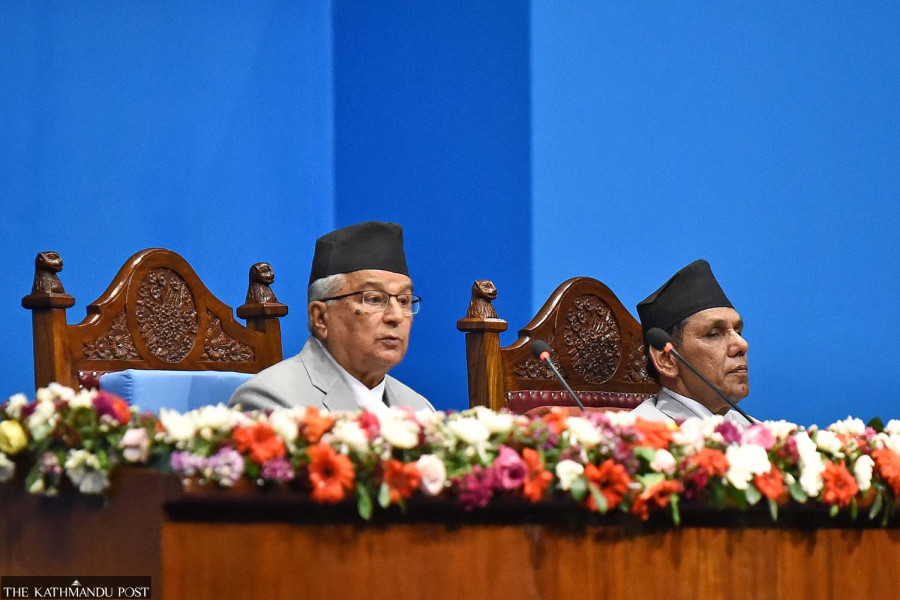National
Government’s policy document reaffirms pledge to constitution amendment
Vows to pass school, civil service laws during the ongoing House session. Opposition criticises the document as aimless, outdated, blind to geopolitics.
Post Report
Amendment to the Constitution of Nepal was a major point in the seven-point agreement between the Nepali Congress and CPN-UML that laid the foundation for the formation of the incumbent KP Sharma Oli government in mid-July last year.
Other than in political speeches, the issue did not receive concrete attention after the government was formed. So much so that addressing the party’s central committee in January, Oli had said amending the constitution would not be possible before 2087 BS or 2030-31. He claimed that waiting for five more years was necessary to push through the amendment.
However, the government’s policies and programmes for the upcoming fiscal year 2025-26 has expressed commitment to revise the constitution. President Ramchandra Paudel presented the policy document before the joint session of Parliament on Friday.
“The government will move forward with the process of amending the constitution based on consensus, while reviewing it and correcting the shortcomings seen during its implementation," reads one of the points in the policies and programmes. If the government fully implements its commitments, which often is not the case, the revision in the constitution would need to be pursued by mid-July 2026, four years earlier than what Oli had claimed in his party meeting.
Creating an environment for the effective implementation of the exclusive and concurrent powers of the federal, provincial, and local levels, is another commitment the policies and programmes has made. The pledge has been made before parliament when the provincial and the local governments have been deprived of exercising their constitutional authority even as around a decade has passed since the statute came into force.
Various laws need to be enacted for an effective implementation of federalism. The government has announced plans to promulgate them from the ongoing session of the federal parliament that commenced on April 24. As per the policies and programmes, the School Education Bill and Federal Civil Service Bill will be passed during the ongoing parliamentary session. The ruling parties earlier this week made a written commitment to school teachers to ensure the school education law gets endorsed by June 29. Similarly, civil servant groups have also warned of agitations if the civil service bill is delayed any further.
The Oli administration has also announced to prioritise amendment to the Nepal Police Act, which is necessary to adjust the police force under provincial jurisdictions. Provincial governments have long been demanding police adjustment to exercise their constitutional authority to maintain law and order.
The policies and programmes that set the foundations for the national budget include a wide range of issues, from reprioritisation of development projects based on their need and budget availability to the preparation of timelines for their construction.
Other priorities including, addressing problems facing the academic sector, improvement of youth-focused startup programmes, with priority to Generation Z, expansion of healthcare workforce to balance the demand and supply of health services, restructuring of the health insurance programme and coordination among federal, provincial, and local governments for the commercialisation of agriculture and development of infrastructure. Through the policies of programmes, the government has also announced plans to scrap redundant government structures, expand faceless and online services.
“An integrated project bank will be established to eliminate duplication in the plans of the federal, provincial, and local levels,” announced Paudel. "All previously announced infrastructure projects will be reprioritised. For projects to be completed in the upcoming fiscal year, a timeline will be set. Necessary resources will be assessed for both ongoing and planned projects. Projects without adequate resources will be postponed, and flawed projects will be scrapped."
Ruling party leaders have hailed the document claiming it is focused on achieving government goals, while the opposition has criticised it as merely ritualistic.
CPN (Maoist Centre) leader and former finance minister Barshaman Pun said, “The policies and programmes show no clear destination. This government would have chosen to do so to shape the budget accordingly.”
He stated that while such policies should have provided a clear direction on development and infrastructure but the present government has completely failed in doing so.
Rastriya Swatantra Party lawmaker Shishir Khanal, said the policies and programmes have completely failed to assess the geopolitical context and have given continuity to the programmes that failed, repeatedly.
“It looks copied from the old ones, and poorly so—like a student who doesn’t even understand what they’re copying,” Khanal said. “It should have addressed Nepal’s position in the global geopolitical context and proposed steps accordingly—that's missing. They’ve continued failed programmes from the past, which should not have been done.”
Talking to the media after the presentation Balaram Adhikari, minister for land management, cooperatives, and poverty alleviation, said the government’s policies and programmes are realistic.
Lawmakers will discuss the policies and programmes for six days starting Monday and the document will be put to a vote after the prime minister answers to concerns raised during the discussions on May 11.




 8.22°C Kathmandu
8.22°C Kathmandu













